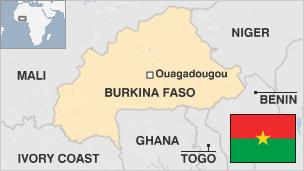

-
9 June 2015
- From the section Africa

A poor country even by West African standards, landlocked Burkina Faso has suffered from recurring droughts and, until the 1980s, military coups.
A popular uprising forced long-term leader Blaise Compaore from office in October 2014.
An interim administration was put in place for a year, after which elections are to be held.
Burkina Faso has significant reserves of gold, but cotton is the economic mainstay for many Burkinabes.
This industry is vulnerable to changes in world prices.
A former French colony, it gained independence as Upper Volta in 1960. Since independence, the military has on several occasions intervened during times of crisis.
In 1983 Capt Thomas Sankara seized power and adopted radical left-wing policies.
He renamed the country Burkina Faso, which translates as “land of honest men”.
In 1987 Mr Sankara was overthrown and killed in a coup by his erstwhile colleague Blaise Compaore, who went on to re-introduce a multi-party system.
Burkina Faso has faced domestic and external concern over the state of its economy and human rights, and allegations that it was involved in the smuggling of diamonds by rebels in Sierra Leone.
Troubles in neighbouring Ivory Coast have raised tensions, with Ivory Coast accusing its northern neighbour of backing rebels in the north and Burkina Faso accusing Ivory Coast of mistreating expatriate Burkinabes.

